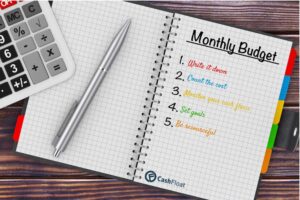Beginner’s Guide to Personal Finance: How to Manage Your Money

Introduction
Personal cash management plays a crucial role in personal financial planning and gaining the financial position. Based on the strategies you learn, it is possible to get back control of your money, decrease the amount of stress that it causes and start planning for the future.
This guide provides an outline of the fundamentals of more effectively managing one’s personal finances focusing on goal setting, insurance and retirement. Here is a list of some essential tips that may be useful even if you are a completely new stock trader, as well as for those who want to improve their financial strategy.
Exploring Simple Personal Finance Facts
Personal finance is all about handling your money in order to address your wants and fulfill your desires. It covers the processes of formulation of budgets for specific goals, besparing, investing, and keeping a reserve in case of emergencies.
Knowledge of the fundamentals puts you in a position to make appropriate decisions on issues which affect your pocket. First of all, you should begin to follow your money trails to determine where your money goes. This will provide you with an overall outlook on how you operate financially and hence it will assist you understand where you need to pay more attention and save more on.
Defining Short Term and Long Term Financial Objectives for a Secure Financial Tomorrow
Therefore the process of laying down of financial goals is the starting point of towards the building of a sound future. Understand your target or goal you want to meet; maybe it is to buy a home, pay off a loan, or save for retirement? Organise your goals according to a short-term, medium-term and long-term classifications.
If goals are to be enacted successfully, they must be stated clearly and achievable time-frames should be provided for them. As for me, it will be easier for me influence my goals as it keeps them constant reminders makes me more motivated to achieve them. It helps to just regularly glance over them and tweak them if necessary to make sure you’re on the right track.
How to build a Proper Budget Which Makes Sense for You
A realistic budget is one of the best weapons against your money newPositionYear Job Title Printed: NewPositionMonthDay 0 Relevant Blogs Brand Yourself with LinkedIntent.ca Email Etiquette: Essential Tips Your New Best Friend is A.C.T. Are You the Office Misfit? First step is to iterate down your source of income and expenses.
First make sure needs such as shelter their food and those all important utilities are paid, and put something aside for saving. Use the 50/30/20 rule: Divide spending into necessary expenses (needs) taking half of it, Next, there is the spending for items you would like to have but do not need taking a third of it, and the last category is the spending on savings and or debts using the last part, a third of the amount.
Budget tracking helps you to stay on the right track when spending, and make adjustments where necessary. You can note from this paper that budgeting is a process that makes it easier for you to manage your finances hence meeting the various goals.
The Importance of Building an Emergency Fund
An emergency fund provides for the reserve in the event of the occurrence of any unpredictable event, including a disease or accident and their consequences. It is also important to hope to be able to set aside a college fund of three to six months of living expenses.
Begin with pocket change by creating a saving plan that will entail setting funds apart every fiscal cycle. The funds should be kept in a special savings account in case of necessity. It gives one a free mind that during an emergency you do not have to borrow via credit cards or take a loan.
Debt Control: Strategies for Paying Off Your Loans and Credit Card
Debt control is important if people hope to be financially independent. First of all, create a list of all your credit, including interest rates and minimum payments on them. All other debts should be paid without extra money while this one is to be fully paid down, with just the minimum being made in the other accounts.
Explore the debt options you should follow such as the debt snowball method or the avalance method. Do not borrow money and refrain from spending on anything that isn’t absolutely necessary. Speaking of credit rates, paying off debts is beneficial, as it helps to raise your credit score, and to have extra money both for savings and additional investments.
Difference between Saving and Investing
Savings and investments are two kinds of instruments available to finance our future requirements. Savings are for meetings short-term needs or urgent obligations, and it should be placed in demonstrably liquid accounts. Savings, on the other hand, is a form of reasonably long term fund mobilization for purpose of buying assets like shares, bonds or buildings.
Savings on the other hand are safer forms of generating an income, investments on the other hand are equally on the higher side but require some sort of risk. Knowledge of both forms assists you in achieving the desired outcome of investment with timely funding while focusing on wealth accumulation.
How Get Started with Investing
Investing can be intimidating at first, but it seriously doesn’t have to be. It starts with the identification of your financial objectives and your ability to take relatively risks. Learn the basics regarding the alternative investment opportunities available in the market including stocks, mutuals, or ETF.
It may be advisable to open an investment account with a competent online trading company. Be patient, and be willing to make gradual, but steady investments in your online marketing efforts. Diversifying your portfolio reduces risk. Turning to finance gurus or employing the services of an online automated financial advisor can also make this quite easy.
Understanding Insurance: Protecting Your Assets
Insurance is a necessary element of individual financial management, which helps to provide your property and minimize dangers. Some of the general types are health insurance, auto insurance, home insurance and life insurance.
Use self assessment and identify what policies you need to meets your needs. To get desired value of the plans and premiums both, it leads to comparing between the two. Insurance protects against occasional situations and prevents them from negatively affecting someone’s money. Hoping to make changes, reviewing your policies every now and then helps one to identify the changes in his or her needs as well as the financial goals.
The Role of Retirement Planning in Financial Stability
Savings for retirement mean preparing for the time when a person will no longer work to meet financial obligations. Invest and lent money soon so that the cumulative interest is calculated. Put money into retirement programs such as 401(k)’s or IRA, and learn about matching contribution plans.
Determine from your actual predicted expenditure and its equivalent savings the amount that you will require. Continuous checks should be made periodically to ensure contributions are adequately being made according to progress set. An organized plan ensures an individual has adequate financial security and can have the best retirement time.
Best of the monetary management advice for personal financial management for prosperity
Sustaining personal finance involves discipline and consistency and that is why; Pave a saving plan and stick to it so that you can set a cultured pattern of saving. You should not allow yourself to blow your new higher income through the process of lifestyle inflation. It is essential to make and have a look at your financial goals and achievements frequently.
If you want to make wise decisions in terms of money, then make sure that you try and learn as much about money as you are able to. Eliminate wasteful costs and aime at cost-efficient expenditures. It should also be noted that the establishment and implementation of conscious financial behaviors foretell increased authority and sustainability.
Conclusion
Personal finance is not a cocktail that can be mastered in a day, it takes understanding and hard work. Applying goal setting, sound financial management, understanding of debt, and financial perception, you can create good financial future. The conspicuous activities fluids such as saving, investing and preparing for later stages like retirement make economic sense. Therefore, let it be stated here that progressive improvements are made up of small steps. Begin now, be regular and do not wait for the rewards of good practice of financial life.







